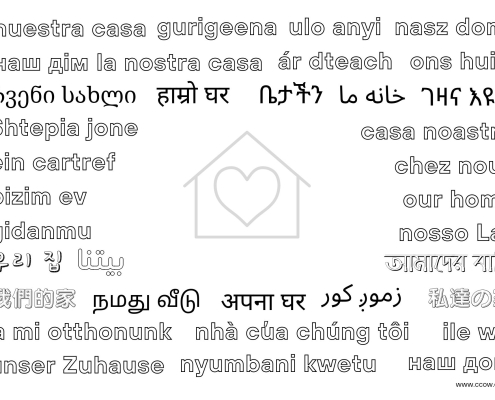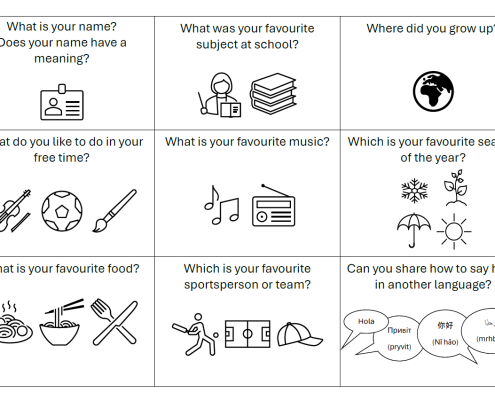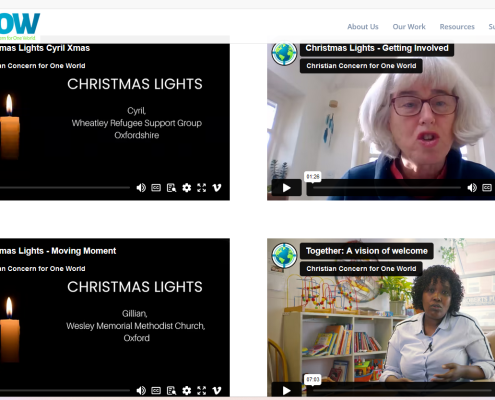Top Tips
- Choose a good day and time – perhaps a lunch after the morning service, or build on an existing coffee morning, afternoon tea, or mid-week group.
- Celebrate the many different homes we come from and the way this is our home together. If you have asylum seekers or refugees connected to your church, you may wish to extend a special invitation. If you don’t, you’ll probably still have people from lots of different parts of the UK and other countries – so celebrate that!
- Make your meal or refreshments as international as possible by asking people to bring and share a dish from their home country or to use one of our recipe suggestions. Alternatively, you could open up your church kitchen to allow people to cook together – particularly appreciated by people living in asylum accommodation without their own cooking facilities.
- Make as much provision for dietary restrictions as you can (gluten-free, lactose-free, Halal, Kosher, etc). Use labels with full lists of ingredients as much as possible, so that people can eat safely and happily.
- On the tables put our specially designed multi-lingual paper placemats to colour in (printable pdf below), together with some coloured pens/pencils to share, and also some conversation starter cards (printable pdf below) – great ways to get people interacting with their neighbours .
- You might want to have a speaker; someone from a local refugee group or charity, e.g. Sanctuary Hosting or CCOW, or share one of the video clips we’ll be producing with people speaking about “home”. You might also want to have some printed materials about welcoming sanctuary seekers for people to look at..
- If appropriate, you could give the opportunity to make a donation to your church’s work with refugees, CCOW and/or another local refugee charity.
Resources
Placemats
Our downloadable Refugee Week A4 paper placemat says ‘Our Home’ in multiple languages, with space at the centre for people to add their own if it’s not already there. You might want to have coloured pencils or pens on the table, to encourage guests to colour in or around the words “Our Home” – and to add their own.
Recipes
Whether you’re from the UK, have lived abroad, or are from a different country, there’s probably some food which says “home” for you, and if you’d like to try something new we have recipes which people contributed from their home. Click on the photo to go to the recipes people have already shared. If you have an international recipe you’d like to share with us and others, we’d love you to email it to us!
Conversation starter cards
Simply print off this sheet of suggested conversation starters (with pictures to aid comprehension for anyone who has limited English) and cut along the lines to make 9 cards to scatter on each table. They’re a good way for people to start up conversations with the people sitting next to them.
Videos
Welcome Churches will be producing video material which shares refugees’ and church leaders’ stories about home, churches, and welcome. In the meantime, why not look at our other videos, collected here.
Things to think about …
… when you’re preparing your meal
For the safety of people attending your meal/coffee morning/tea, and to comply with Food Safety and Hygiene Regulations, we recommend asking those preparing food (whether at home or in a church/hall kitchen) to follow some simple guidelines. If you’d like to see sample guidelines from other churches, please contact us.
… when you’re having conversations
The aim of this shared time is to ensure that everyone feels that, wherever they come from and whatever they believe, your church is a safe space that offers them a home.
That’s why the conversation starters stick to fairly neutral topics. They give people a chance to have conversations, without pressing anyone to say more than is comfortable for them. We’ve tried to avoid questions that, for people who’ve left their homes because they had to do so, might stir up strong emotions. If you sense that any question might make someone uncomfortable, don’t put it out (and let us know – it’s great to have feedback).
It goes without saying that you’ll want to avoid probing about why people came to the UK, as this may be a subject associated with trauma. However, some refugees may volunteer some of their story, and if so, you can help them feel comfortable by listening with empathy.
When talking about countries and cultures it’s easy inadvertently to give the impression that one way of doing things is better than another. We hope everyone will consciously try to avoid doing this and instead encourage each other to celebrate our different traditions and ways!





